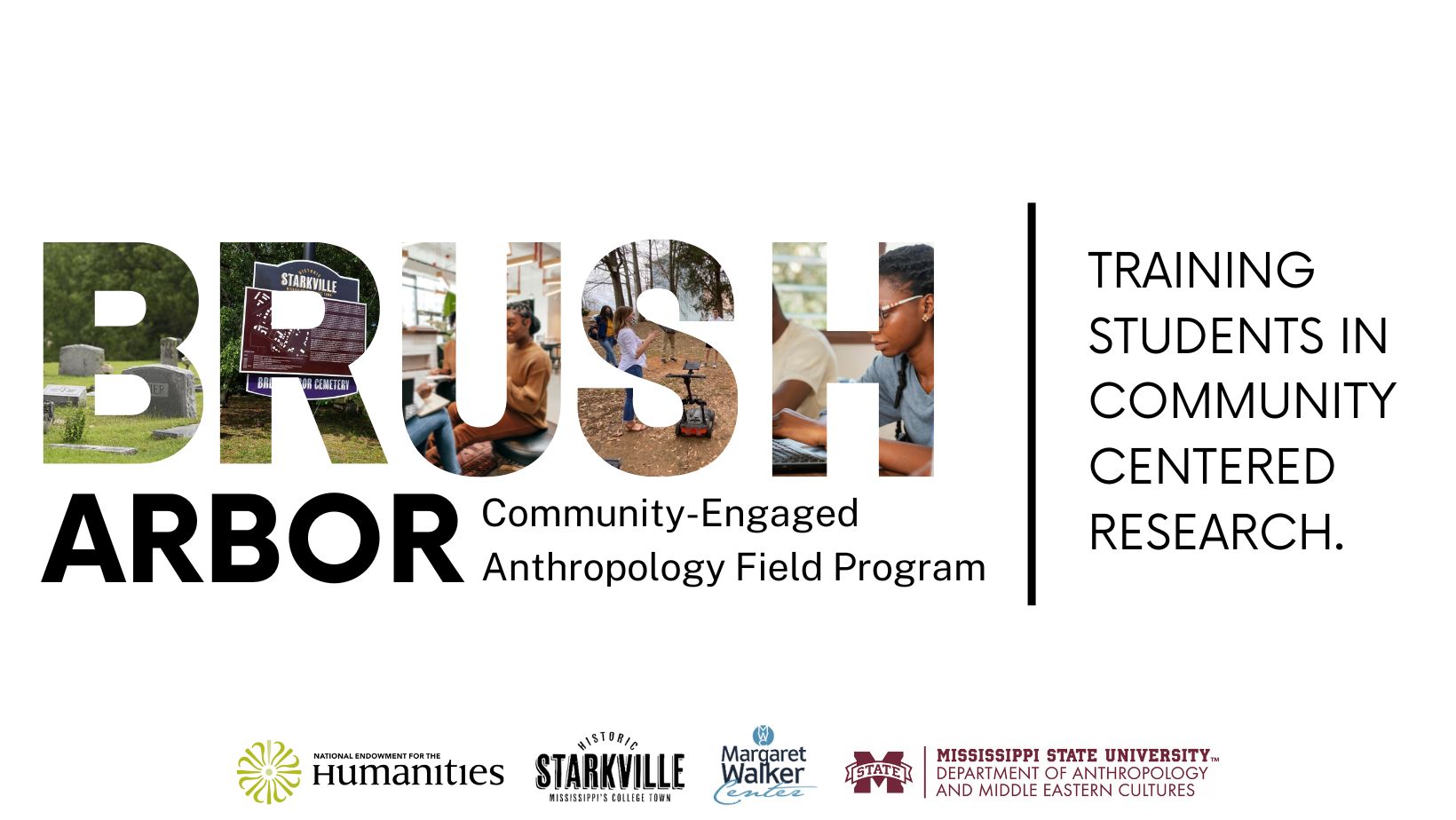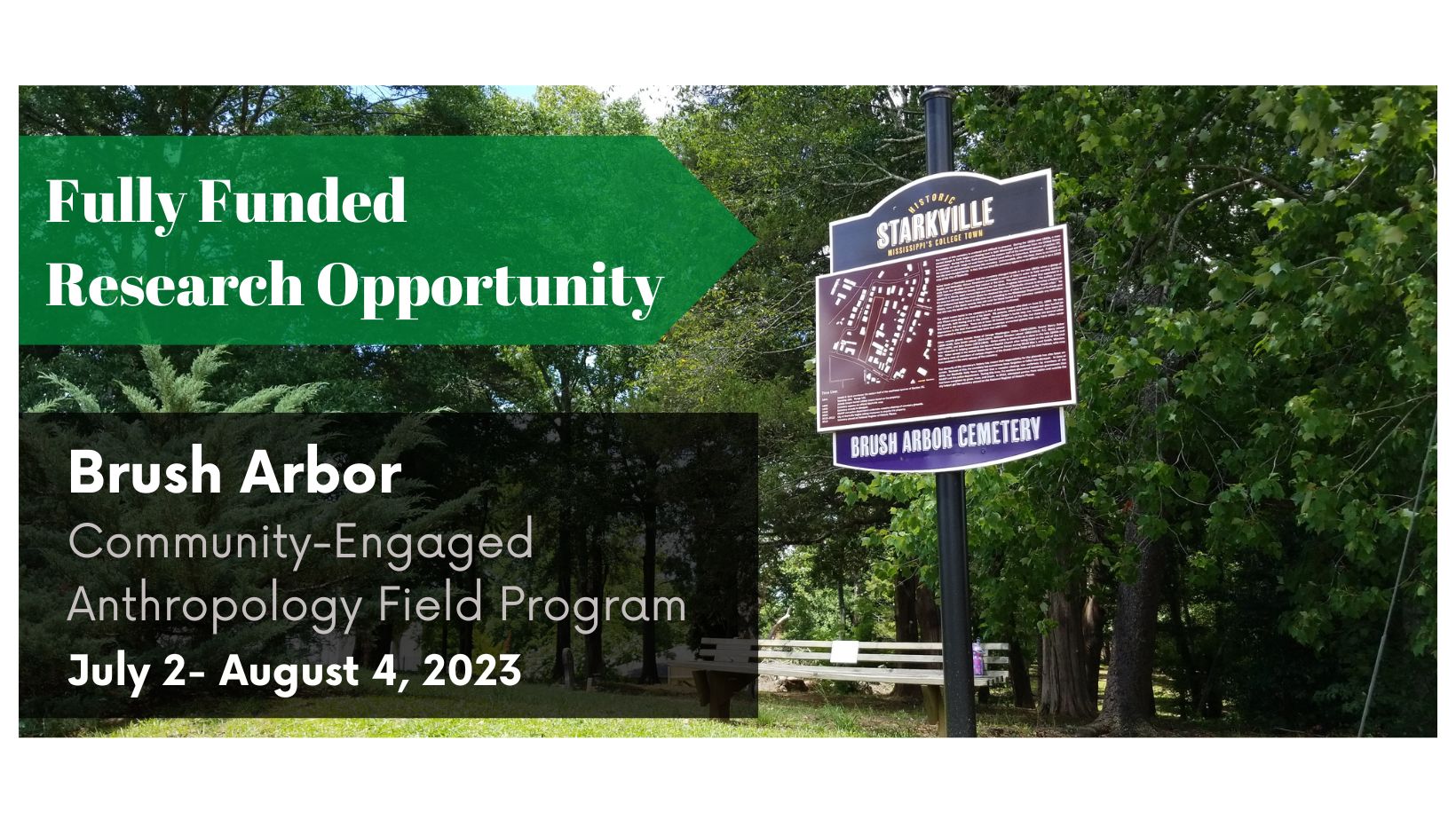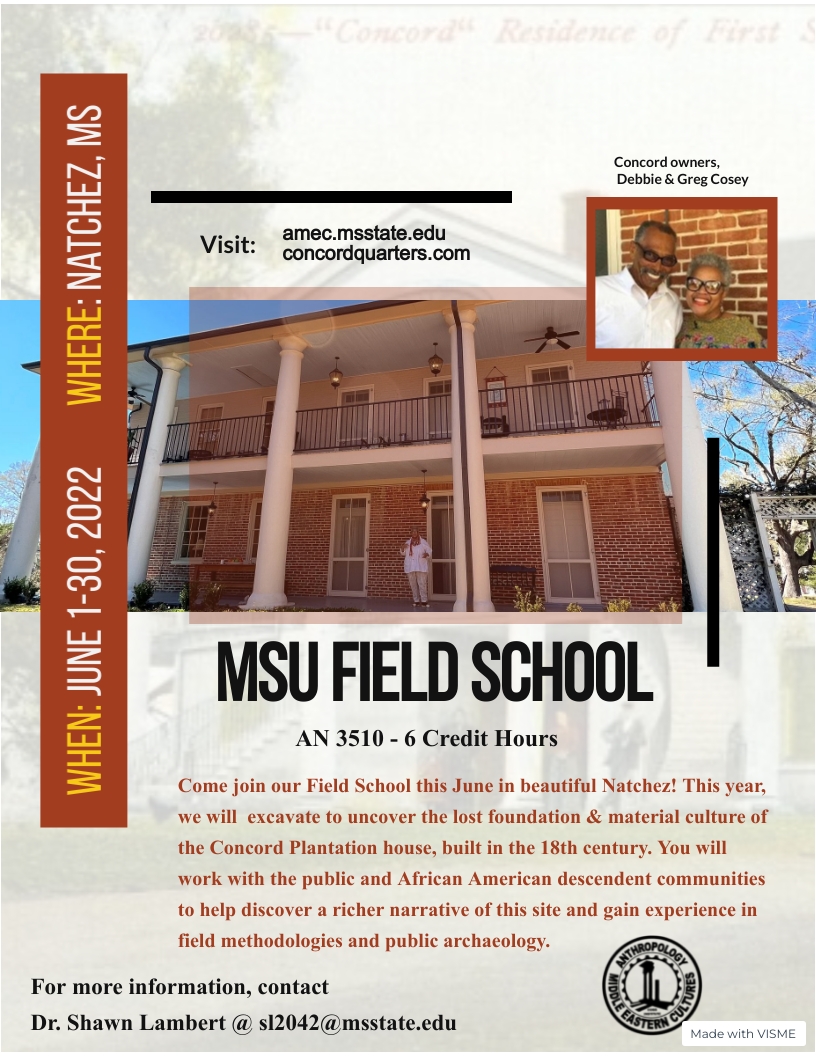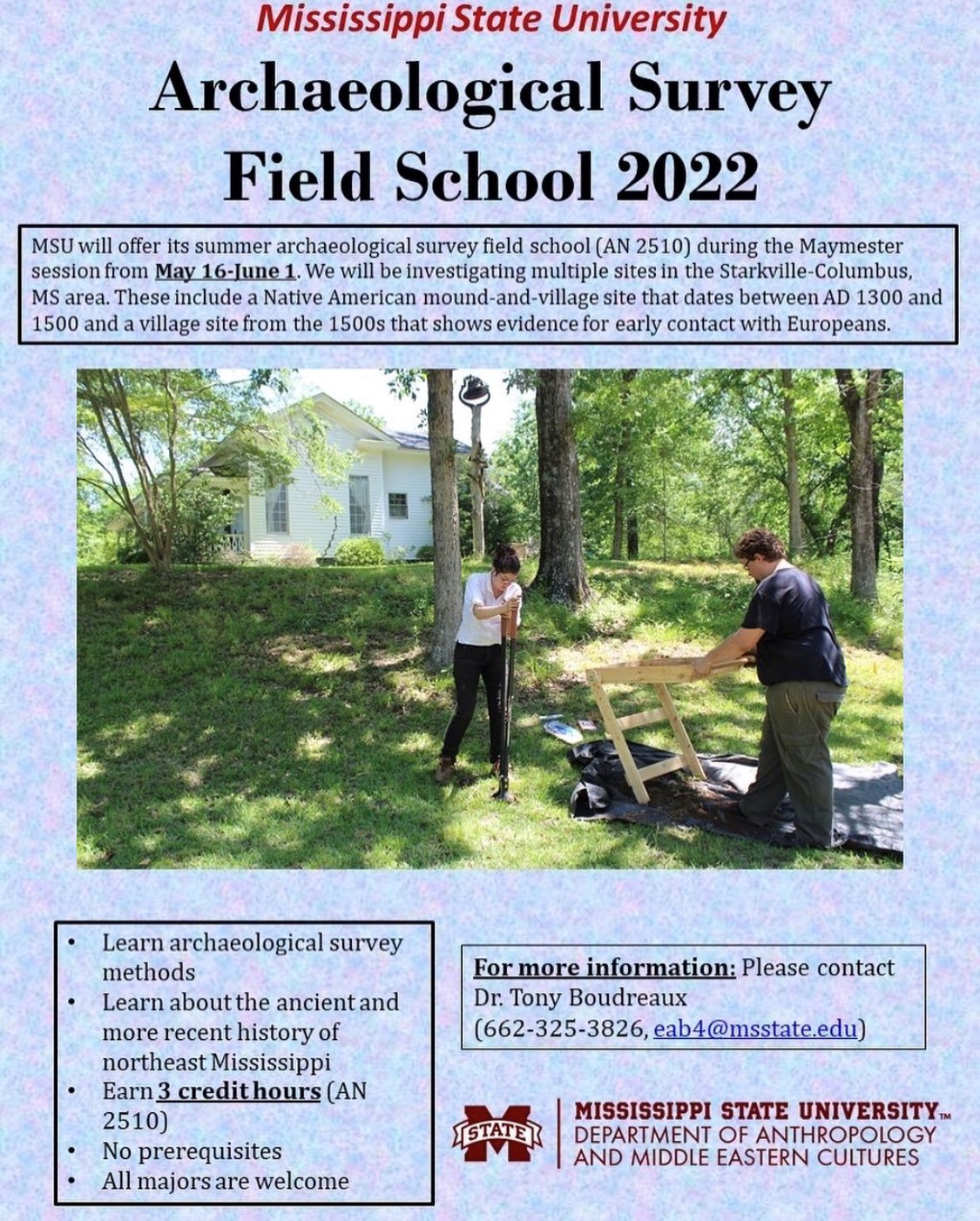AMEC offers several archaeological and bioarchaeological field schools, which are excavation-based and survey-based. Our archaeology field schools focus on the archaeology and bioarchaeology of the Middle East, the Caribbean, and the Southeastern US. These field schools are offered during the summer months, are taught by AMEC faculty, and are open to graduate student and undergraduate students at Mississippi State University as well as other colleges and universities. Those offered in St. Croix, US Virgin Islands and Israel are part of Mississippi State University’s Office of Study Abroad. Information, location, and specifics vary for each program, so please see the links below.
Summer 2023
Brush Arbor Community Engaged Field Program
About the Program
The Brush Arbor Community Engaged Field Program is a community based, multidisciplinary field school operated by Mississippi State University’s Department of Anthropology and Middle Eastern Cultures.
The program will examine the use of Brush Arbor Cemetery in Starkville, MS through archival, archaeological, historical, and anthropological work. Students will use a variety of methods working to preserve this African American cemetery through a decolonial and community-based restorative model. Students will engage in many cutting-edge methods such as GPR and GIS-based analysis of the cemetery, archival research, oral history, and story mapping.
During the field program, students will develop community engaged research projects that increase community awareness of the Brush Arbor Cemetery and contribute to the Brush Arbor Digital Archive. The field program will culminate in a public anthropology day where students will present their research projects.
Important Dates
Applications due: March 19
Decisions Available: April 15
Field School Period: JuIy 2-August 4
Eligibility Requirements
We seek students interested in pursuing graduate studies in applied/cultural anthropology, history, archaeology, African American Studies, Museum/Archival Studies, or related fields.
Advanced undergraduates and graduate students (both MA and PhD) who are pre-comprehensive exams students are encouraged to apply.
Program Benefits
This is a fully funded research opportunity. Selected participants will receive housing, meals, a stipend. Travel funds are also available up to $300 per participant for travel to the field school.
Required Components
First, please Complete Application- bit.ly/brusharbor
Please email brusharbor@anthro.msstate.edu with the following information in PDF format:
- Resume/CV with academic and personal experience
- Unofficial university transcript(s)
Contact Information
Please contact brusharbor@anthro.msstate.edu with any questions.
Summer 2022
AN3510 - Excavation at the Concord Plantation Site, Natchez, MS, (June 1 - June 30, 2022)
Come Join our field school this June in beautiful Natchez, MS! This summer, we will excavate to uncover the lost foundation and material culture of the Concord Plantation house, built in the late 18th century. Students will work with the public and descendant communities to help discover a richer historical narrative of the site and gain experience in field methodologies and public archaeology.
AN2510 - Survey Field School in Starkville/Columbus, MS (May 16 - May 31, 2022)
Summer 2020
AN2510 - Survey Field School, Spirit Hill Farm in Holly Springs, MS (May 8th - May 31st, 2020)
The 2020 Survey Field School for AMEC at Mississippi State will be at Spirit Hill Farm, MS. Students will learn the basics of conducting archaeological survey, using and creating spatial data, artifact identification, and learning basic geophysical methods. Please contact Dr. Shawn Lambert (Shawn.Lambert@anthro.msstate.edu) for more information. (3 Credit Hours/ In-State Tuition + fee)
AN3510 - Excavation Field School, The Hester Site in Amory, MS (June 1st - June 29th, 2020)
One of the 2020 excavation field schools for AMEC at Mississippi State will be at the Hester site, MS. Students will learn the basics of conducting archaeological excavation, using and creating spatial data using a total station, artifact identification, and learning basic geoarchaeological methods. Please contact Dr. Shane Miller (dsm333@msstate.edu) for more information. (6 Credit Hours/ In-State Tuition + fee)
AN 4313/6313 - Bioarchaeology in Croatia I in Zagreb, Croatia (May 11-June 13, 2020)
This is a three-credit, intensive lab and lecture course that provides an overview of the methods used in biological anthropology for studying human remains as well as the techniques used to develop biological profiles used in forensic case work. In this course, students will intensively study the skeleton from the coronal suture to the distal end of the distal foot phalanges. The course is first and foremost focused on the anatomy and physiology of the human skeleton, with emphasis on evolution, function, growth, and development. Students will learn to identify all the bones in the skeleton, major landmarks of each skeletal element, and basic skeletal biology. Additional studies in the estimation of age at death, estimation of sex, pathological recording, and trauma analysis will also occur using skeletal collections from the Institute for Anthropological Research (IAR). Students will get multiple guest lectures on Croatian history, evolutionary relationships, advanced methodology in bioarchaeology, and violence theory. Students will also get field trips to a local hospital to see imaging studies of bioarchaeological material and get guided tours of the Archaeological Museum Zagreb and the Krapina Neanderthal site. Please contact Dr. Anna Osterholtz for more information (aosterholtz@anthro.msstate.edu).
Note: you will be in contact with and handling real human bone on a daily basis. This course is not cast-based, we will be using archaeological remains from numerous sites throughout Croatia, dating from the Paleolithic to the modern era. They are priceless and irreplaceable. They must be handled with care and treated with respect.
AN 3510 - Bioarchaeology in Croatia II in Đurđevac, Croatia (June 13-July 15, 2020)
This is an excavation-based field methods course held at the site of Sošice located in Đurđevac, Croatia. This is a multiperiod site, spanning the 16-19th centuries consisting of a multiple construction phases of a church and associated burials. Excavations have been conducted under the auspices of the Muzej Grada Koprivince in Đurđevac during (2015-2018). We will be working with the museum and several Croatian students to complete excavation of burials interred in the church foundations. In addition to the architectural and extended burial excavations, students will be exposed to excavation of commingled remains from the burial fill. Students will live and work together as a group while gaining experience in the methods of archaeological field excavation, burial excavation, and will have a special focus on GIS mapping and photogrammetry. Students will have multiple guest lectures covering local culture history and archaeology, and a guided tour of the Krapina Neanderthal site and an active archaeological site near Pozega. Please contact Dr. Anna Osterholtz for more information (aosterholtz@anthro.msstate.edu).
AN 3510 - Bioarchaeology in Croatia I & II in Zagreb, Croatia and Đurđevac, Croatia (May 11-July 15, 2020)
This program begins with a 3-credit, intensive lab and lecture course that provides an overview of the methods used in biological anthropology for studying human remains as well as the techniques to develop biological profiles used in forensic case work. Students will intensively study evolution, function, growth, and development. Additional studies in the estimation of age at death, estimation of sex, pathological recording, and trauma will also occur. The second half of the program is an excavation-based field methods course held at the site of Sošice located in Ðurdevac, Croatia for up to 6 credits. The church and cemetery at the center of the excavations was in use between the 16-19th centuries. We will be working with the museum and several Croatian students to complete excavation of burials interred in the church foundations. Students will gain experience in the methods of archaeological field excavation, burial excavation, and will have a special focus on GIS mapping and photogrammetry. Please contact Dr. Anna Osterholtz for more information (aosterholtz@anthro.msstate.edu).
Previous
- The Allendale Chert Quarry Excavation Field School in South Carolina, taught by Dr. Shane Miller and Derek Anderson
- The Hesi field school in Israel, taught by Dr. Jimmy Hardin.
- The Excavation-based bioarchaeological and archaeological field school on St. Croix, taught by Dr. Molly Zuckerman and Derek Anderson.
- The survey field school, to be taught at the Poverty Point World Heritage Site in Louisiana by Jeffrey Alvey, May-June 2017.



